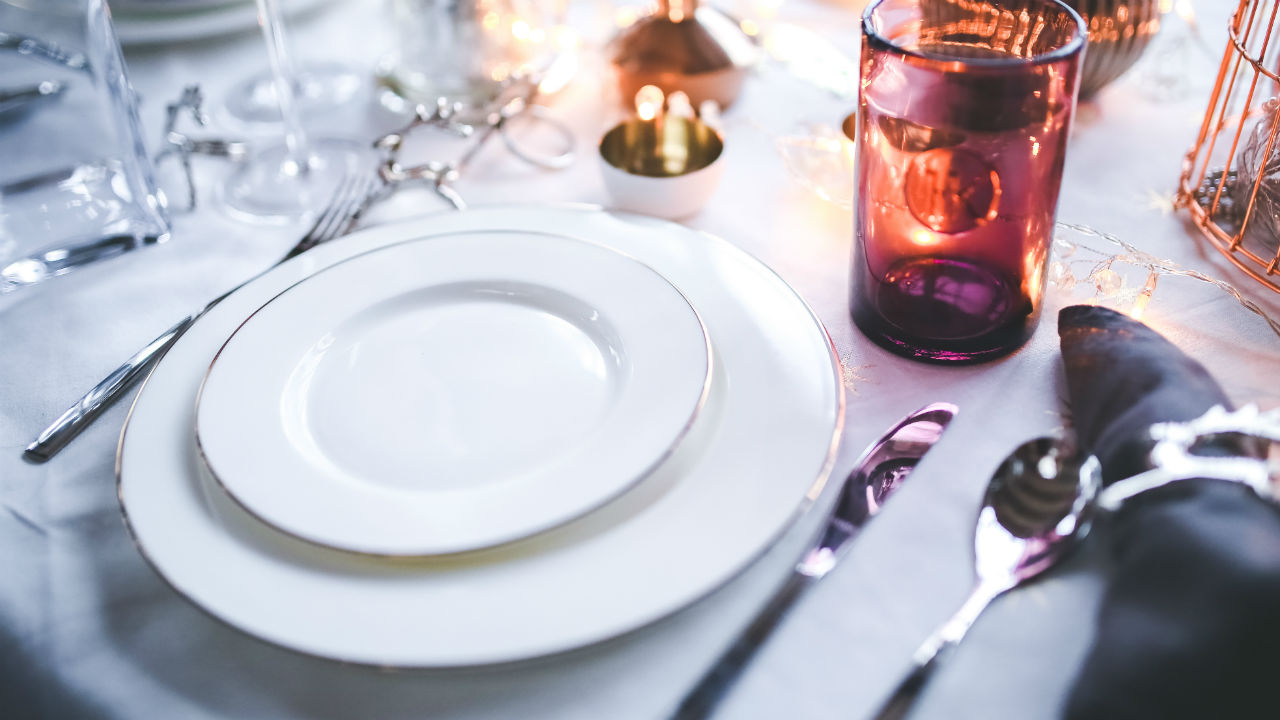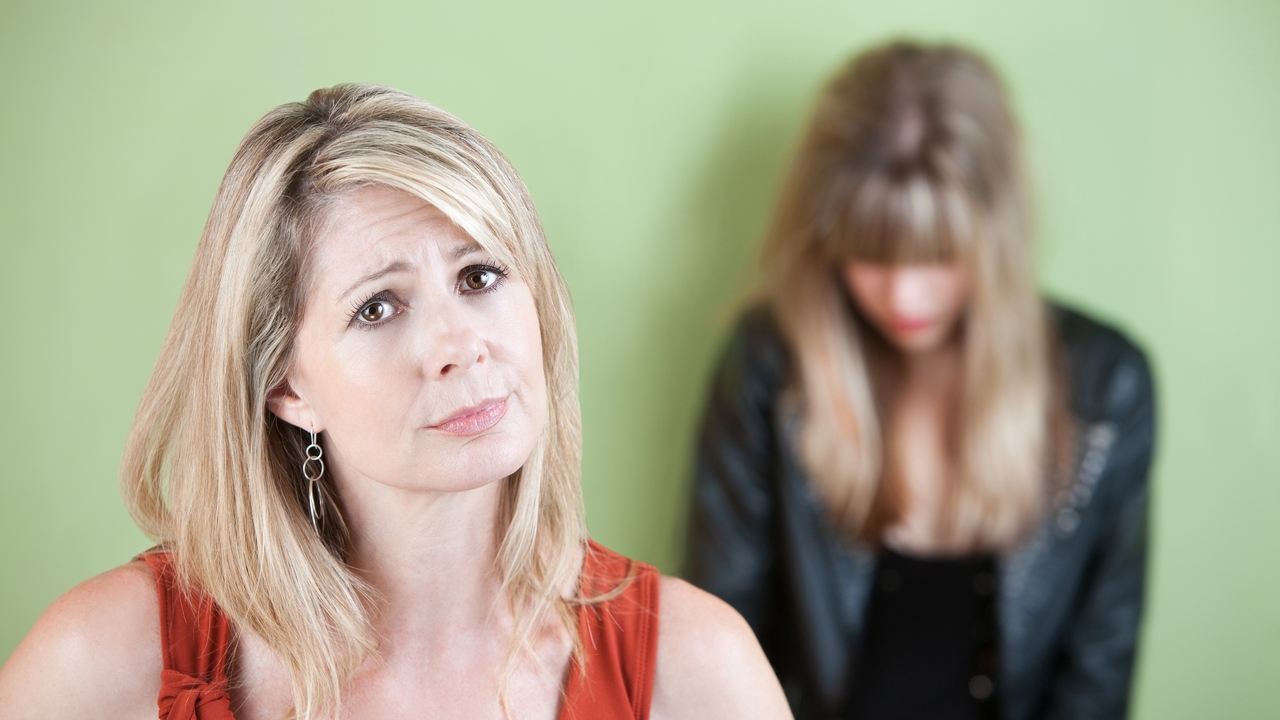Anorexia is a disorder where a woman sees food as her enemy, has a body image that is quite distorted (appearing fat to her while she appears thin
to others), and where an unrealistic fear of getting fat pretty much runs her life. Anorexics often eat less and less food, starving themselves to a level that disrupts their lives and hurts their health.
In bulimia, which is more common than anorexia, a woman has just as distorted a body image and also sees food as her enemy, but she will eat it -- and then purge it from her body, either by forced vomiting or overuse of laxatives. There is an actual shame she feels from eating and almost a rush from being able to remove the food from her system without digesting it, leading to the "binge" part of the cycle. Some bulimics will binge and purge several times in a day. Their low body weight threatens their health the same way it does in anorexia, but they can also have problems from the laxatives or from stomach acid eating away the enamel on their teeth.
Here's a page on the symptoms, effects and treatment of anorexia:
http://www.womenfitness.net/anorexia.htm
and here's a page on the symptoms, effects and treatment of bulimia:
http://life.familyeducation.com/bulimia/nutrition-and-diet/48918.html
It's important to realize that eating disorders are control disorders, too. The person who is managing their weight with anorexia or bulimia feels an enormous amount of control in doing so, and the thought of losing that control is so frightening that the disorder continues.
Here are some links to Brown University studies on why eating disorders begin, why control seems so important, and links with definitions and resources for getting help:
http://www.brown.edu/Student_Services/Health_Services/Health_Education/nutrition/ec_ued.htm
Have you ever had an eating disorder, or known someone who has suffered from one? Are there experiences or insights that you can share that might help others in your shoes?
All user-generated information on this site is the opinion of its author only and is not a substitute for medical advice or treatment for any medical conditions. Members and guests are responsible for their own posts and the potential consequences of those posts detailed in our Terms of Service.





Add a Comment7 Comments
I am so glad you are reading that book; it is indeed wonderful. You might also find comfort and insight in the book, My Life With Ed.
Are you continuing to seek support for your depression and disordered eating? Recovering from an eating disorder is thought of as a journey; a "journey to recovery", as it is a daily choice as you said.
I am also concerned that your daughter is already hearing messages that she is fat at age 5, and this is making you very upset to hear these words from her. She is most likely taking cues from your behavior, as kids do use us as their role models (the good and the bad, and there is not a perfect role model out there!!). How do you respond to your daughter when she has negative body talk? It is wonderful that she is verbally expressing these thoughts and feelings, as NOW is the time to help her develop positive body image; it is when she starts internalizing and stops verbalizing these thoughts that will be more difficult for you to help her with. Be happy that she is sharing these feelings with you, and there are MANY activities you can do with her to help her see and feel the positive attributes she possesses. I bet they could even help you, too (they could help all of us). An example: you both sit in front of the mirror, and take turns saying what you like about yourselves, including both physical, mental,emotional, intellectual. It is funny to see young kids, as most of them can not stop saying enough good things about themselves, and if she gets going...it could be contagious! As her mom, you can also tell her all the positive things you see in her, both the physical and non-physical. The physical is not only about what is "pretty" or "thin", but also about how lucky we are that are arms are long enough to hug each other, our legs are strong enough to kick a ball and play tag. Focusing on what our bodies can DO, not what they look like, is a great activity.
What would you think about continuing to seek counseling, both for your depression and eating disorder recovery, but also to learn more tips on how to help your daughter?
June 6, 2010 - 8:07pmThis Comment
I was dianogsed with an eating disorder when I was 14 and admited in a psych hospital, for other reasons, and have been struggling ever sense. While I do not go for days and days with out eating I still cling to old habbits you could say. I rarely eat breakfast unless I am making it for both my daughter and boyfriend and dinner is the same way. At both I tend to eat about half of an adverae adult helping and fight with myself at night to not go tot he kitchen and get a snack. Its usually worse when I am depressed. At those times I tend to often forget I havent eaten and go like that for two or three days and return to what I have come to learn is dysfunctional eating. On other occasions the opposit is true I will be depressed and binge eat to an excessive amount then not eat for two or 3 days afterwards. I have to point out that I tend to eat quite healthy compared to adverage people and work out regularly so its not like I am grabbing a bag or chips or carton of ice cream.
On one had I hate that I am this way because I dont want my daughter (she is 5) to develope the same habbits. She is already underweight from being a micro-preemie and at 5 years old is only 32 pounds. I hear her occasionally say things like she is fat and it makes me want to cry.
At the same time no matter how well I do for a while once the depression hits or something is bothering me enough to where I dwell on it all day my eating habbits go right back to what seems safe and controlable.
I have been actually been reading a really interesting book on eating disorders by Amiee Liu called "Gaining" and it has given me some insight on reasons eating disorders happen.
June 6, 2010 - 2:20pmThis Comment
You might also find helpful information on our Eating Disorders Page, and stories from others who have either battled anorexia or bulemia, or have had loved ones going through what you are.
Thank you for sharing your story!
March 2, 2009 - 7:04pmThis Comment
Thank you for writing on this topic Diane and Alison for clarifying a few points. I am recovering from an eating disorder that I have struggled with since I was eight but it went undiagnosed for years. I was in and out of the emergency room for numerous things throughout my child hood that doctors now link to the fact that I bounced between anorexia and bulimia for the majority of my life. At the time it was not something that is as openly talked about as it is now so much of my suffering was done in silence. It was not till I was a junior in college that one of my school doctors asked me the simple question, "Why are you so thin?" That anyone had ever even questioned my weight. Thankfully, I went to a large university that had an entire department devoted to eating disorders. Since I had already been in the emergency room three times that year because of heart and lung complications my doctors told me that I had two choices get better or die. The next day I started daily out patient treatment. Although it has taken years and been a tough journey filled with disappointment and relapses I can finally say that I am healthy. To all of those people out there who are not afraid to talk about it and who are not afraid to ask thank you.
March 2, 2009 - 11:47amThis Comment
I, too, have rather recently been able to say that I am truly healthy and happy. I struggled with anorexia and bulimia for over five years and was hospitalized a year and a half ago - voluntarily. That was the best decision I ever made. Life with an eating disorder is awful. It is a life full of shame, secrets, self-hatred, and wasted energy. I would leave friends, family, everyone in an instant if I felt the need to binge and purge. NOT binging is not an option - you will do ANYTHING possible to get your hands on food, whatever kind of food is available. It is just as bad as a heroin addiction..so much that I ended up stealing money and food just to fulfill my addiction. I failed all of my classes because I was too busy eating and puking to bother doing my work. I put myself in the hospital when I hit 82 pounds.
I have so much more free time now. I eat when I'm hungry and I don't when I'm not. I haven't weighed myself in months. Most of the clothes I wore when I was ill don't fit me anymore and I have thrown them all away so they don't trigger me into wanting to starve again. I'm healthier and happier than I ever have been. I hope one day I can share my story with a young girl suffering from an eating disorder and inspire them to get healthy while they're young so they can lead healthy, productive lives.
March 2, 2009 - 3:19pmThis Comment
One last comment, for now:
It is also important to know that a "purge" can mean different things for different individuals. It is not only about vomiting or using laxatives, but over-exercising can also be used to purge.
November 11, 2008 - 4:08pmThis Comment
thanks for writing about this extremely important topic!
Through my seven years of working in a wellness office at a University, I spoke with dozens of students every year who were in different stages of recovery from their eating disorder, and many students who were still suffering from their eating disorder.
Another important thing to remember about eating disorders: they have THE NUMBER ONE HIGHEST mortality rate among ALL mental illnesses.
I could write pages about this topic, it was very near and dear to my heart. There are so many factors that play a role in WHY some people have an eating disorder, and others do not. Some of the factors are genetics, some are environmental reasons (the nature vs. nurture equation).
Here are some of the things I learned:
- Numerous college students started out thinking they were doing something healthy for themselves: watching their diet and exercising. They say they were just profoundly impacted by the positive (weight loss) results and all of the compliments they received. So, they kept going and eventually turned this healthy habit into a dangerous, life-threatening habit and disease. Perhaps genetics plays a role for these individuals, and/or there is a family history of eating disorders or other mental illness.
- Eating disorders are NOT about the food. The food is just the mechanism that the individual uses. Eating disorders are about intense fear, control, body image distortion and many, many other factors.
- It is important to get to know the individual person, what is their love/hate relationship with their eating disorder. Why are they keeping "it" around? It is truly a relationship; something that person thinks about every minute of every day: planning schedules and social activities around meal times and workout times.
An excellent book that describes living with an eating disorder:
My Life with Ed
Excellent National Resources:
November 11, 2008 - 4:05pmhttp://www.nationaleatingdisorders.org/information-resources/general-information.php#causes-eating-disorders
http://www.anad.org/
This Comment